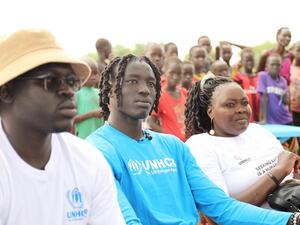Humanitarian concerns in Sudan, region
Humanitarian concerns in Sudan, region
UNHCR obviously shares the deep concern of the Secretary-General and the rest of the UN system over the ordered departure of several NGOs from Sudan and the serious implications this has for humanitarian efforts on behalf of hundreds of thousands of extremely vulnerable people in Darfur and elsewhere.
For UNHCR's part, at least five of the NGOs asked to leave Sudan have been UNHCR implementing partners carrying out important humanitarian programmes in Darfur but also Blue Nile State and Khartoum State. So it is noteworthy that this could have an impact not only on Darfur, but on vulnerable people elsewhere in the country.
We also have to be concerned at the possible implications this could have more broadly in the region. Our experience shows that when vulnerable populations are unable to get the help they need, they go elsewhere in search of protection and assistance. If food can't get through to people, for example, then those people will soon suffer and have to look elsewhere.
With some 4.7 million Sudanese - including 2.7 million internally displaced - already receiving assistance in Darfur, we are very concerned over the prospect of new population movements in the region should the fragile aid lifeline inside Sudan be disrupted. There are also 40,000 Chadian refugees in West Darfur.
Our work for internally displaced people as part of the UN team in Darfur has helped IDPs stay as close to home as possible while also relieving pressure on neighbouring Chad, where UNHCR and its partners are already caring for nearly 250,000 refugees from Darfur in a string of 12 remote camps spread over 600 km near the Sudan border. These isolated camps and the remote communities surrounding them are already struggling to provide the basics needed to sustain 250,000 refugees. In addition, there are some 180,000 internally displaced persons in eastern Chad.
Any influx to Chad would be an additional challenge for UNHCR and other humanitarian agencies because of ongoing insecurity and instability in the country, as well as limited resources such as water.








